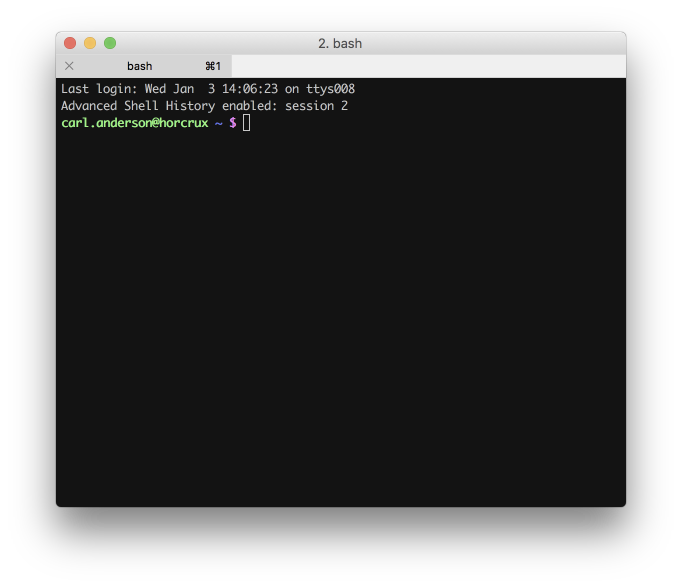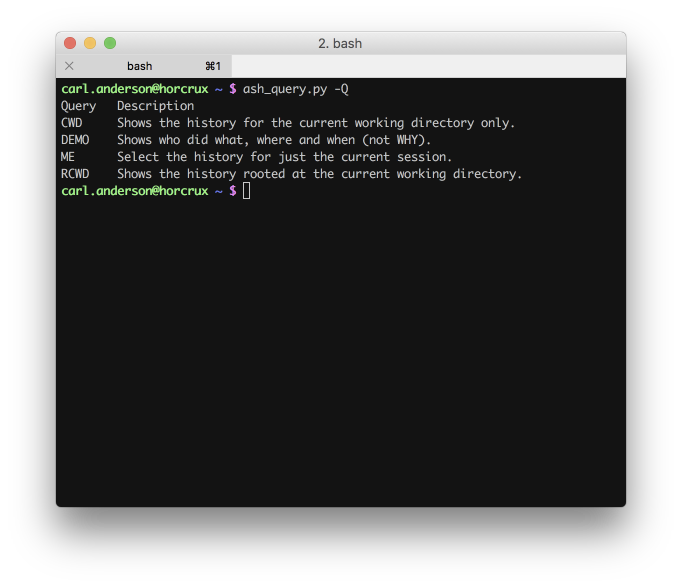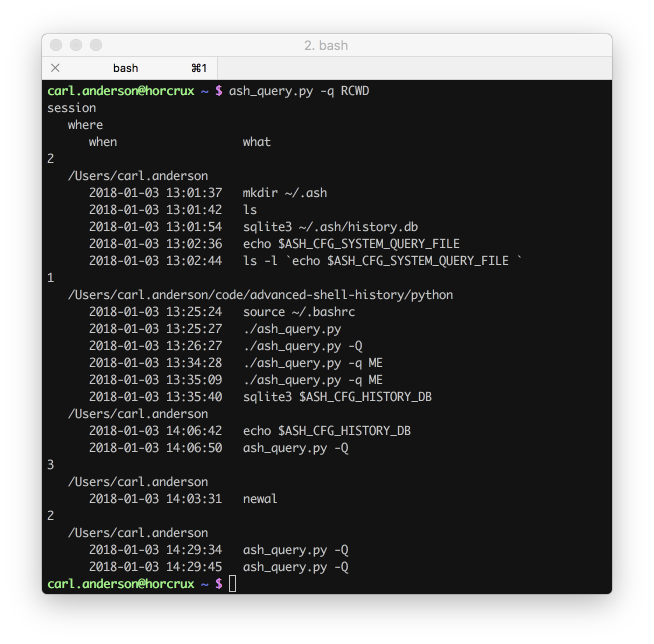Save your command line history in a sqlite3 DB!
- Retains extra command details:
- exit code
- start and stop times (and command duration)
- current working directory of the command
- session details such as tty, pid, ppid, ssh connection details
- works with multiple shells (zsh and bash)
- saves history into a sqlite3 database
- provides a convenient tool to query the history database.
make build_c # Builds the C++ version
make build_python # Builds the Python version
make build # Builds both versions
- A full build of the code from source depends on the following commands
or utilities existing on your build system:
- awk
- bash
- curl
- flex (optional: only needed if rebuilding
queries.cppfromqueries.l) - g++ and gcc
- make
- sed
- tar
- unzip
- Also recommended is
sqlite3for interacting with thehistory.db. - In OSX, you will need to install xcode to compile the C++ version: http://developer.apple.com/xcode/
make install_c # Installs the C++ version
make install_python # Installs the Python version
make install # Installs both versions
You will need to source a couple files in order for this to work by default.
First, source the configuration file in /usr/local/etc/advanced-shell-history/config.
This will define several environment variables that are needed for the logger and the
query app.
Next, export the ASH_CFG_SYSTEM_QUERY_FILE if you would like to use the systemwide
queries! Without this exported line, the ash_query command will not know where to find
the queries needed to extract from the history database.
Finally, you must source the shell code for your shell. For example, bash users source
/usr/local/lib/advanced_shell_history/sh/bash and zsh users source /usr/local/lib/advanced_shell_history/sh/zsh.
Here's a snippet you can paste into your ~/.bashrc file:
source /usr/local/etc/advanced-shell-history/config
export ASH_CFG_SYSTEM_QUERY_FILE
source /usr/local/lib/advanced_shell_history/sh/bash
Remember to source ~/.bashrc after you modify it!
Once you have the hooks in place, you can confirm it's working by opening a new terminal and checking for history being logged.
If you see the message Advanced Shell History enabled: session 1 - congratulations!
If you don't see the message above, make sure you are sourcing the correct files and that they are installed as expected.
Next, you should also be able to confirm that the ash_query command works by using
the -Q flag. The -Q flag lists all the available queries.
You can invoke a query using the -q flag (notice: lowercase) and passing a query
name to go with it. For example, ash_query -q RCWD will show all per-directory
history rooted from the current working directory.
make uninstall
This program operates on the assumption that your shell gives you the ability to execute a custom operation before a prompt is redrawn on your terminal.
Bash provides the PROMPT_COMMAND environment variable while zsh gives us the
precmd environment function. Both are repurposed by this program to log the
previous command into a local database before each new prompt is displayed.
Many people have never heard of this feature or found a great use for it. However, if you currently DO use this feature, you can still use this program. The code renames your existing hook and invokes it after saving the previous command.
- this is not meant to be a security auditing tool - it's for user convenience and meant to enhance shell builtin history.
- for bash users, this overrides your
PROMPT_COMMANDand changes the default options of your builtin history. Hopefully both are an improvement. - for zsh users, this overrides your
precmdfunction. The shell script attempts to rename your previousprecmdfunction and continue to hook into it. - all users will notice that the
PIPESTATUS/pipestatusvariables have been renamed toPIPEST_ASH/pipest_ash. Because these variables are transient and logged, they cannot be easily restored. Instead they are copied. - when you build this, the Makefile may download a version of sqlite3 (if it's not already included in the tarball or the svn repo).
- this potentially changes your normal shell history settings to enable options necessary for the magic to work.
- The C++ version does not compile in OSX because the CLOCK_MONOTONIC symbol is undefined.
- Use the python version for now.
- Doesn't capture exec'ed commands: example:
exec rm /tmp/foo # is lost - The python version is about 10x slower than the C++ version.
carl.anderson@gmail.com (Carl Anderson)
2018-01-03



